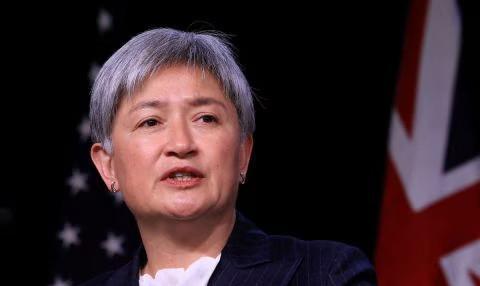
Don’t Support Tariffs: Aus Foreign Minister as US Tariffs on India Take Effect
In a recent development, the United States has imposed 50% tariffs on several Indian products, including aluminum and steel. The move has sent shockwaves across the globe, with many countries expressing concerns about the impact of such measures on international trade. Australia, in particular, has taken a strong stance against tariffs, with Foreign Minister Penny Wong emphasizing the importance of a “trusted partnership” between nations.
Wong’s comments come as the US-India trade relationship has been strained in recent years, with the US imposing tariffs on several Indian products, including solar panels and machinery. The latest tariffs, which took effect on June 5, are expected to further exacerbate the situation, with both countries trading blows over the issue.
However, Australia has made it clear that it will not support the US’s tariff policies. Speaking to the media, Wong emphasized the importance of dialogue and cooperation between nations, saying, “What we would want as friends of both countries is to say we share so much…We always encourage dialogue, and we are strong supporters of QUAD.”
QUAD, or the Quadrilateral Security Dialogue, is a security forum that brings together the leaders of Australia, India, Japan, and the United States to discuss regional security issues. The initiative has gained significance in recent years, particularly in the face of rising tensions between the US and China.
Wong’s comments are significant, particularly given Australia’s close ties with the US. The two countries have enjoyed a strong relationship over the years, with Australia being a key ally of the US in the Asia-Pacific region. However, Australia has also been working closely with India in recent years, and has been a strong supporter of the country’s bid to become a permanent member of the United Nations Security Council.
Australia’s stance on tariffs is also significant, given the country’s own experiences with trade tensions. In recent years, Australia has been embroiled in a trade dispute with China, which has imposed tariffs on several Australian products, including wheat, sugar, and beef. The dispute has had significant implications for Australia’s economy, with the country’s trade surplus with China shrinking significantly.
Wong’s comments are also reflective of the changing dynamics of global trade. In recent years, there has been a growing trend towards protectionism, with many countries imposing tariffs on each other’s products. The move has been driven by concerns about job losses and the impact of globalization on domestic industries.
However, many economists argue that tariffs are not the solution to these problems. Instead, they can have significant negative consequences for the global economy, including higher prices for consumers and reduced trade volumes.
Australia’s stance on tariffs is also significant in the context of the ongoing negotiations over the Regional Comprehensive Economic Partnership (RCEP). The RCEP is a proposed free trade agreement between the 10 member states of the Association of Southeast Asian Nations (ASEAN) and Australia, India, China, Japan, South Korea, and New Zealand.
The agreement has been touted as a major step forward for the region’s economy, with the potential to boost trade and investment between the participating countries. However, the negotiations have been slow-going, with several key issues still outstanding.
Wong’s comments suggest that Australia is committed to the RCEP process, and is willing to work with other countries to reach a successful outcome. However, the challenges ahead will be significant, particularly given the varied interests of the participating countries.
In conclusion, Australia’s stance on tariffs is significant, particularly given the country’s own experiences with trade tensions. The move is also reflective of the changing dynamics of global trade, with many countries moving away from free trade agreements and towards protectionism.
As the world navigates these challenges, it is clear that dialogue and cooperation between nations are crucial. Australia’s commitment to a “trusted partnership” with India is a significant step forward, and one that can help to promote greater understanding and cooperation between the two countries.






